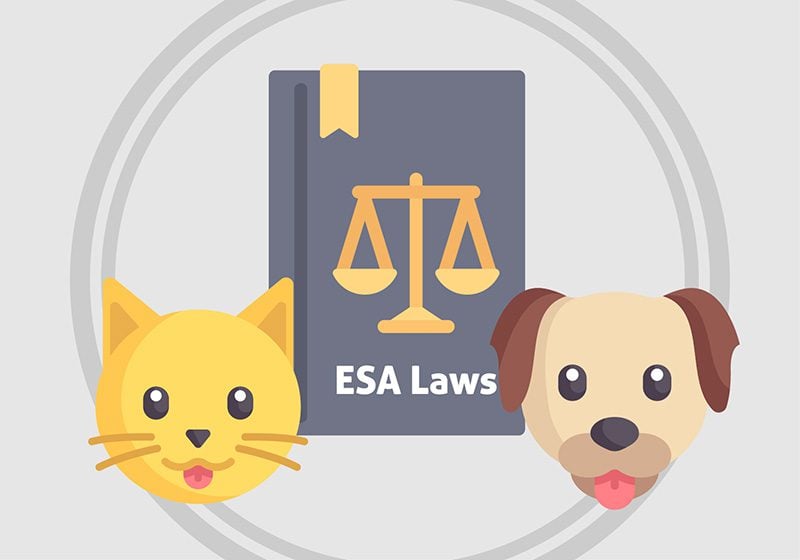Most of us have always been familiar with service animals in some way, but more recently another type of support animal has become more common. Emotional support animals have become more and more popular in recent years due to the mental health benefits they can provide.
Pets offer us companionship, a constant camaraderie that we may need, a comfort when we’re down. Pets are our loyal friends. Sometimes, animals become more than pets or are brought into the home to be more than pets. Animals can offer emotional support statuses that may be much needed for certain mental and emotional ailments.
The question is, what are our rights when it comes to emotional support animals? Can we take them everywhere like we might take a service dog? Are we allowed to travel with them or take them to the grocery store? There are many different facets in play here and they can vary by state.
What Are Emotional Support Animals?
Emotional support animals have become more and more popular in recent years. Statistically, mental health illnesses have risen, and the benefits that can be sought from an emotional support animal have become more noted and sought after.
Emotional support animals are animals that are meant to be companions for someone who suffers from an emotional or mental type of disability. These disabilities include anxiety and depression as the most common types, but many more could fall into the category.
With an emotional support animal, any type of animal that makes the connection could qualify, but the most common types of support animals are dogs and cats. Emotional support animals provide their owners with support that reduces symptoms associated with their emotional disorders.
Some common examples of uses for emotional support animals include calmness during anxiety, nurturing through depression, mental clarity and focus of the mind. These are some basic examples in which an emotional support animal may be beneficial.
In order for an animal to legally be considered an emotional support animal, they must be prescribed by your mental health professional such as a therapist, psychologist, or psychiatrist. The mental health professional must be familiar with the patient and know and understand how a support animal could benefit their personal situation.
Hawaii Specific Emotional Support Animal Laws
Hawaii’s state laws offer broad protection of individuals in need of support animals, but primarily regarding service animals. Each state is able to enact its own laws for emotional support and service animals, as long as they comply with ADA accommodations requirements.
Here is a breakdown of what Hawaii’s laws have to say regarding emotional support and service animals
- Hawaii designates that a service animal is a dog individually trained to perform work or tasks to benefit someone with a disability. Disabilities include physical, mental, sensory, or intellectual disabilities.
- Hawaii does not require business owners to allow emotional support animals to enter but does require accommodation of service animals. Business owners may choose to accommodate emotional support animals if they choose.
- In accordance with the Fair Housing Act, Hawaii does require the allowance of service dogs and emotional support animals for those who truly have a disability and a disability-related need for the animal. This requires health professional statements.
- Hawaii defines public places as public transportation, lodging, public amusement and accommodations, or any place to which the public is invited
- Hawaii’s law does not make any specific accommodations for emotional support animals but does specifically exclude emotional support animals from required accommodations, except where federal regulations apply
Aren’t Service Animals and Emotional Support Animals the Same?
As you can see from the legal standards and requirements, service animals and emotional support animals are not treated equally. Many states have not yet adopted changes to accommodate emotional support animals and the ADA does not require accommodations for these animals thus far.
Service animals are individually trained to provide specific assistance on tasks for their human. They are trained to perform actions specific to the needs of the individual they are working with. These tasks could include applying calming pressure through anxiety attacks, retrieving medicine, pulling a wheelchair, or many other types of assistance.
Emotional support animals are meant to provide an emotional connection that benefits emotional disturbances in our lives. This could include anxiety, depression, or even mental focus amongst other things. Emotional support animals are broadly defined, but keep in mind a mental health professional must be involved for legal consideration.
The primary difference between service animals and emotional support animals is that service animals are highly and specifically trained to perform or assist with tasks based on the needs of the individual they are with, while emotional support animals are companions that have positive mental benefits.
Psychiatric Service Dog in Hawaii
Psychiatric service dogs in Hawaii are those dogs that have been trained to help with a mental, intellectual, or psychiatric disability. These dogs are essential for those with mental health or psychiatric conditions, and they complete tasks such as opening and closing doors, retrieving water and medication, alerting others to an emergency, and interrupting harmful behaviors. Which tasks your psychiatric service dog is trained for tends to remain specific to your needs and the type of assistance you require from your psychiatric service dog.
Hawaii service dog laws follow closely what the Americans with Disabilities Act (ADA) states about these working dogs. In Hawaii, psychiatric service dogs are recognized along with other types of service dogs, such as mobility and medical alert service dogs. Individuals with psychiatric service dogs in Hawaii are able to access public or private spaces with their companion animals as needed, and there are accommodations protections in both Hawaii state law and the ADA.
PTSD Service Dog in Hawaii
Post-traumatic stress disorder (PTSD) is a mental health condition that individuals may develop after experiencing a traumatic event. This condition is commonly seen in individuals who have served in the military, and veterans have one of the highest rates of PTSD.
A PTSD service dog is trained to help relieve the specific symptoms of this condition by completing tasks such as guarding their owner’s back when in public, guiding their owner to safe or calm spaces, checking rooms and around corners for their owner, and providing a grounding sensation during the onset of flashbacks or nightmares. Many individuals find their PTSD service dog essential to their daily lives, and there are plenty of organizations that work to provide PTSD service dogs to those in need.
Registration of Emotional Support Animals
At USSA, we know and understand the importance of both emotional support and service animals and we encourage you to register your support animals. Registration is not required, but it is a professional way to present your animal in public. Many businesses appreciate registered support animals because the registration shows the validity of the support needed.
When you register your animal with USSA, it is simple and convenient and we offer the following benefits:
- Digital and Original registration certificates as well as a Photo ID
- Lifetime registration of your support animal
- Registration into the US Service and Support Animal Registry Database
- Customer service
- On staff attorneys to protect your rights
- On staff medical professional for housing and travel letters
Conclusion
Registering your support animal benefits you and those around you. It provides appropriate information about your emotional support or service animal, which can calm the uneasiness that many businesses feel about support animals.
Emotional support and service animals can play a vital role in our lives. These animals could literally save lives and they are becoming more acknowledged and accommodated as time passes. Know the laws in your area, and be familiar with what is or is not specifically accommodated.

